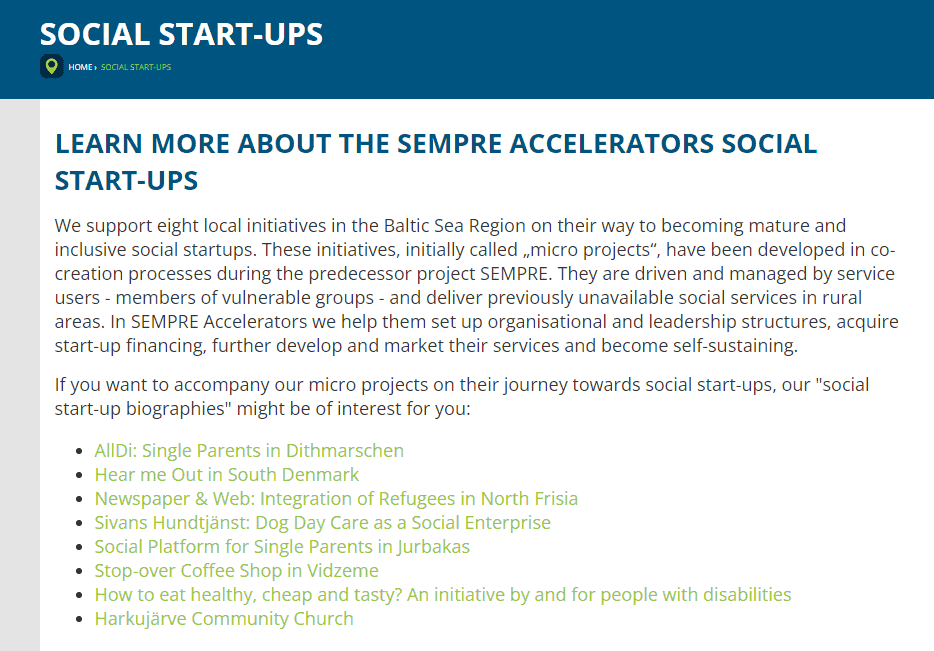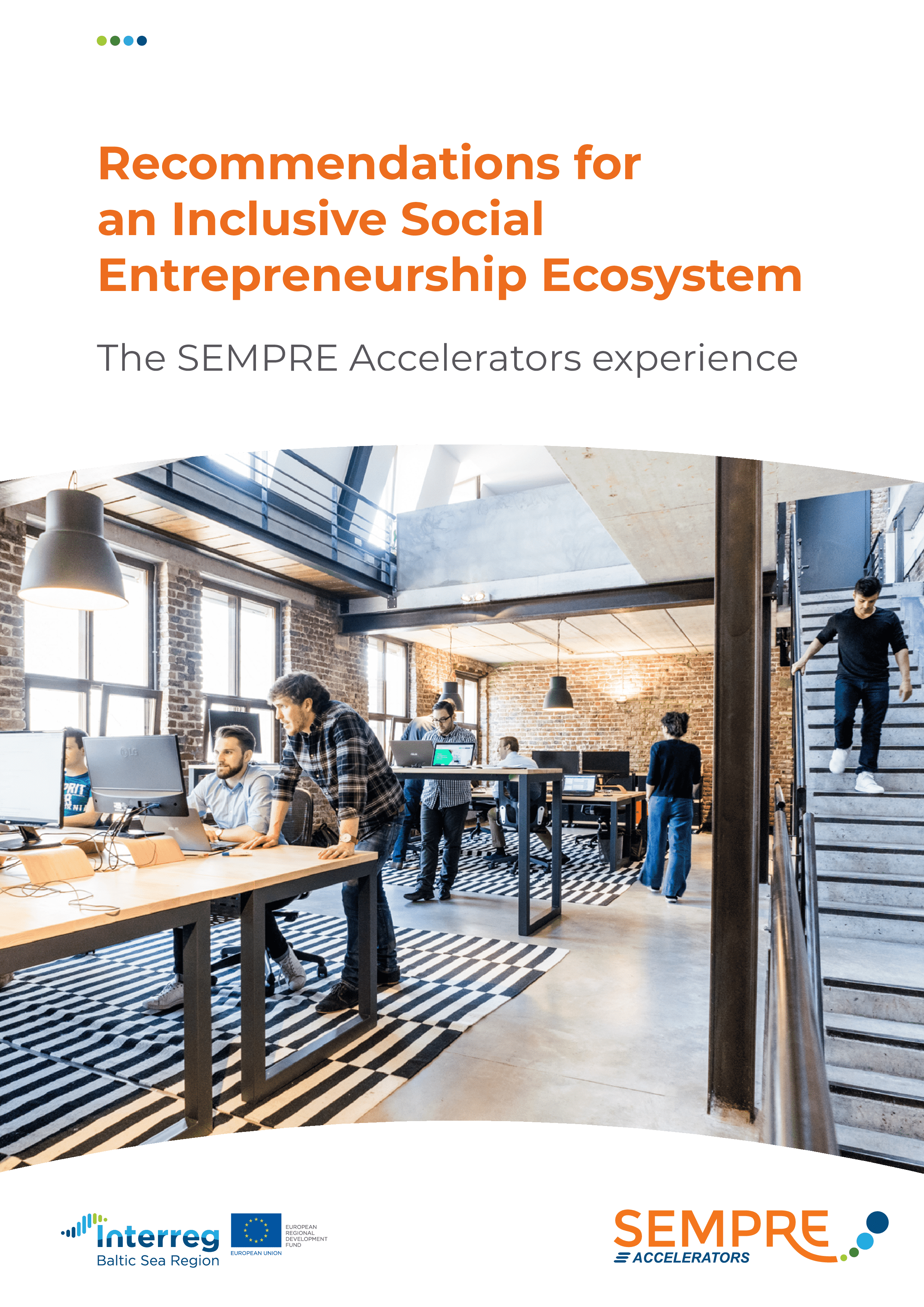SEMPRE Accelerators
More people in need in the countryside
Many rural areas of the Baltic Sea region find themselves in a downward spiral, where outward migration and economic downturn lead to a deterioration of service infrastructure and quality of life and vice-versa. In peripheral regions, competencies that are needed to renew services and stimulate social innovation and entrepreneurship are missing while regional disparities increase. Demographic changes and financial austerity further add to these challenges. Vulnerable groups like single parents, the elderly, or migrants are at the risk of poverty and exclusion as they are strongly affected by this development.
Welfare organisations need to learn how to help with less resources
Social service providers could take care of such vulnerable groups, but they, too, suffer from ever smaller budgets and work force. Social services by their nature aim to build stronger communities and to promote equality and opportunity. They are typically provided by welfare and public sector organisations, NGOs or social enterprises. In the changing settings in our rural areas, social service providers need to find new ways of supporting their clients – they need service innovation. And providers need to find new ways of supporting their clients – they need service innovation. And one new approach is empowerment.
Empowering disadvantaged people to help themselves
Empowerment means that social service providers involve those belonging to vulnerable groups into designing the services they need and ideally into providing those services to each other. Social service providers who use empowerment methods rather connect people who can help each other instead of providing help themselves. Social service providers in some countries (e.g. in northern Germany) had been experimenting with for a while. With SEMPRE they wanted to expand the method to partner organisations in various countries around the Baltic Sea.
SEMPRE Accelerator brings social service to a new level
30 micro projects in eight countries which aimed to empower disadvantaged people were the result of the SEMPRE project. Social workers learned how to use empowerment tools such as the social business model canvas or the theory of change to involve e.g. single parents, people with disabilities or migrants into creating new ideas for social services and testing them. In SEMPRE Accelerators, the partners focus on eight of the most promising micro projects. They turn the micro projects into successful, self-sustaining social start-ups that consistently offer services and/or products on local and regional markets of the Baltic Sea region.
Budgets
in numbers
-
1.09MillionTotal
-
0.78MillionErdf
-
0.08MillionEni + Russia
-
0.00MillionNorway
Achievements
From initiative to real business
The project SEMPRE Accelerators aimed to improve the social service infrastructure by empowering members of disadvantaged groups such as single parents, the elderly or migrants participate in the design and delivery of social services. Institutional capacity building of social service providers was essential for this process to adapt work methods and instruments and successfully manage organisational change to involve users of social services in the co-creation process. Therefore, the project used the experiential knowledge of the members of disadtantaged groups and the professional know-how of the social workers to accelerate the transformation of eight social initiatives into fully-fledged social start-ups. The skills that the project enhanced cover entrepreneurship, management, performance improvement, leadership, marketing and financial management. Some of the social start-ups developed stable and formalised structures, while others succeeded in extending their social service portfolio. As side effects, the new businesses in rural areas paved the way for job creation, increase in social capital, inclusive growth and transfer of experiences.
Concrete examples inspire
Among the examples of how marginalised and vulnerable groups got engaged are: an inclusive stop-over coffee shop managed by disadvantaged young people in Liepa (Latvia); a regional social service for people with mental difficulties getting a voice in society and being able to express their needs, so-called “Hear Me Out” initiative in Esbjerg (Denmark); a social platform for single parents established as a non-profit organisation that offers workplaces for single parents in Jurbarkas (Lithuania); a dog care service founded and run by people in challenging life situations (e.g. difficulties in entering labor market) and with mental disabilities in Luleå (Sweden).
Training and peer learning in accelerator teams
To strengthen the empowerment process, the project gathered the participating organisations and established “accelerator teams” involving social service users on the one hand, and social services providers on the other hand. Through the exchange, co-development and peer learning, the teams addressed the jointly identified needs, obstacles and possibilities to overcome such challenges as setting up stable and efficient management and leadership structures, extending the range or improving the quality of the offered services, acquiring financing and involving more service users in operation and management of the start-up. The process was also facilitated by external experts helping to streamline the actions, initiatives and solutions. In addition, the project ensured that peer learning would also happen within a transnational framework, when accelerator teams exchanged their experiences across borders. The feedback from the exchange served as a basis for a review of the earlier publications, namely the empowerment handbook for social workers, the organisational roadmap for leaders in social services and the guidebook on empowerment training and development of recommendations for an inclusive entrepreneurship ecosystem.
Outputs
Eight social start-ups

Recommendations for an inclusive social entrepreneurship ecosystem

Project Stories
Partners
Diaconie of Schleswig-Holstein
- TownRendsburg
- RegionRendsburg-Eckernförde
- CountryGermany
- RepresentativeDoris Scheer
- Phone
- E-Mail
- Web
University College South Denmark
- TownEsbjerg Ø
- RegionSydjylland
- CountryDenmark
- RepresentativeJens Juulsgaard Larsen
- Phone
- E-Mail
- Web
Academy of Economics Schleswig-Holstein
- TownKiel
- RegionKiel, Kreisfreie Stadt
- CountryGermany
- RepresentativeHartwig Wagemester
- Phone
- E-Mail
- Web
Sunderby Folk High School
- TownS Sunderbyn
- RegionNorrbottens län
- CountrySweden
- RepresentativeCatharina Ljungcrantz
- Phone
- E-Mail
- Web
Lutheran diaconia
- TownVilnius
- RegionVilniaus apskritis
- CountryLithuania
- RepresentativeIngrida Karūnienė
- Phone
- E-Mail
- Web
Vidzeme University of Applied Sciences
- TownValmiera
- RegionVidzeme
- CountryLatvia
- RepresentativeMadara Narnicka
- Phone
- E-Mail
- Web
Diaconal centre Liepaja
- TownLiepaja
- RegionKurzeme
- CountryLatvia
- RepresentativeMartin Urdze
- Phone
- E-Mail
- Web
Foundation for Diaconia and Social Work of EELC (Estonian Evangelical Lutheran Church)
- TownTallinn
- RegionPõhja-Eesti
- CountryEstonia
- RepresentativeAvo Üprus
- Phone
- E-Mail
- Web
Karelian Research Centre of the Russian Academy of Sciences (KarRC RAS)
- TownPetrozavodsk
- RegionRepublic of Karelia
- Country
- RepresentativeAlexandra Smirnova
- Phone
- E-Mail
- Web
-
Project managerDoris ScheerDiakonisches Werk Schleswig-Holstein, Landesverband der Inneren Mission e.V.
-
Legal representativeKay-Gunnar RohwerDiaconie of Schleswig-Holstein
-
Financial managerSusann GreveDiakonisches Werk Schleswig-Holstein
-
Communication managerHauke SiemenREM Consult



